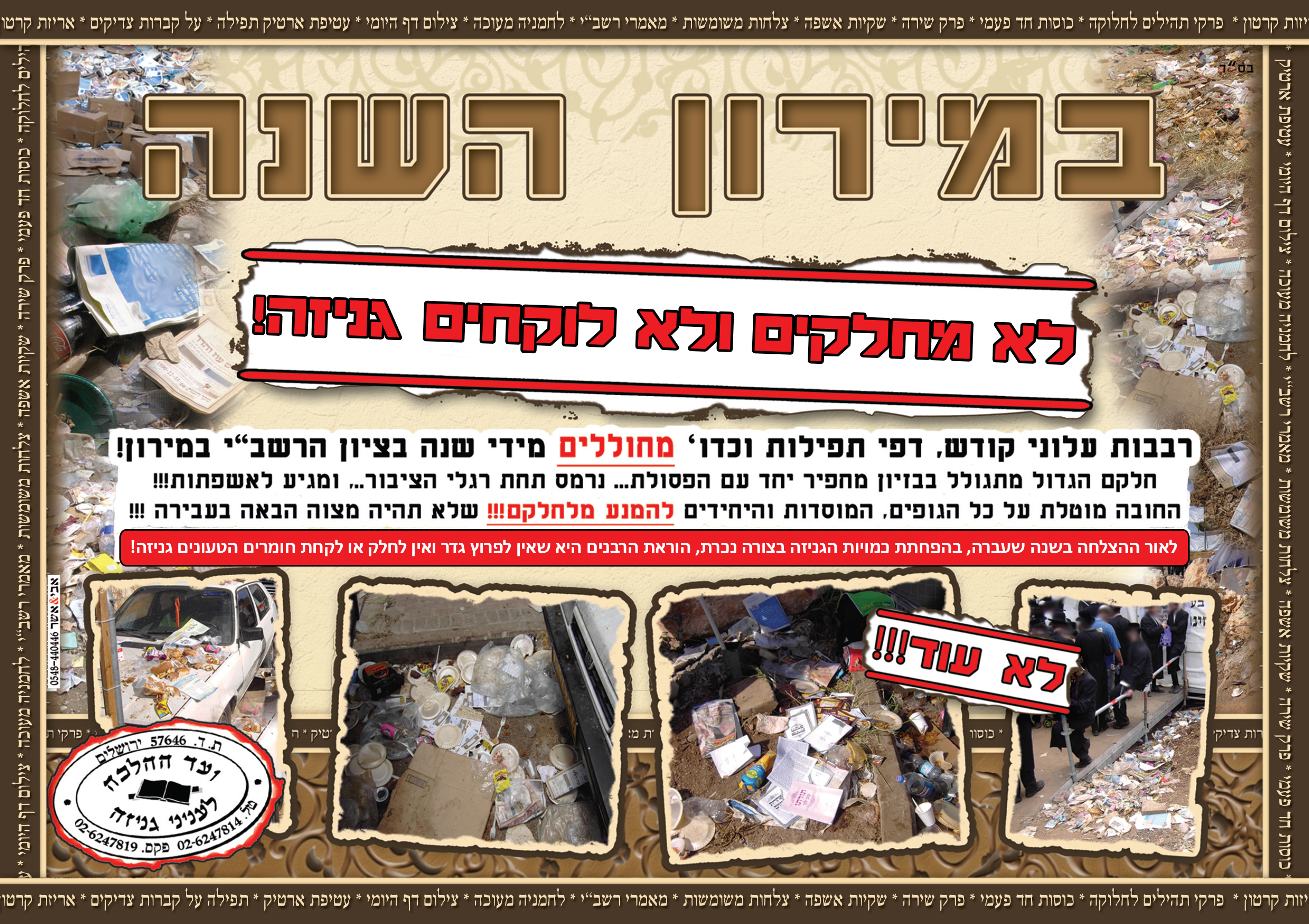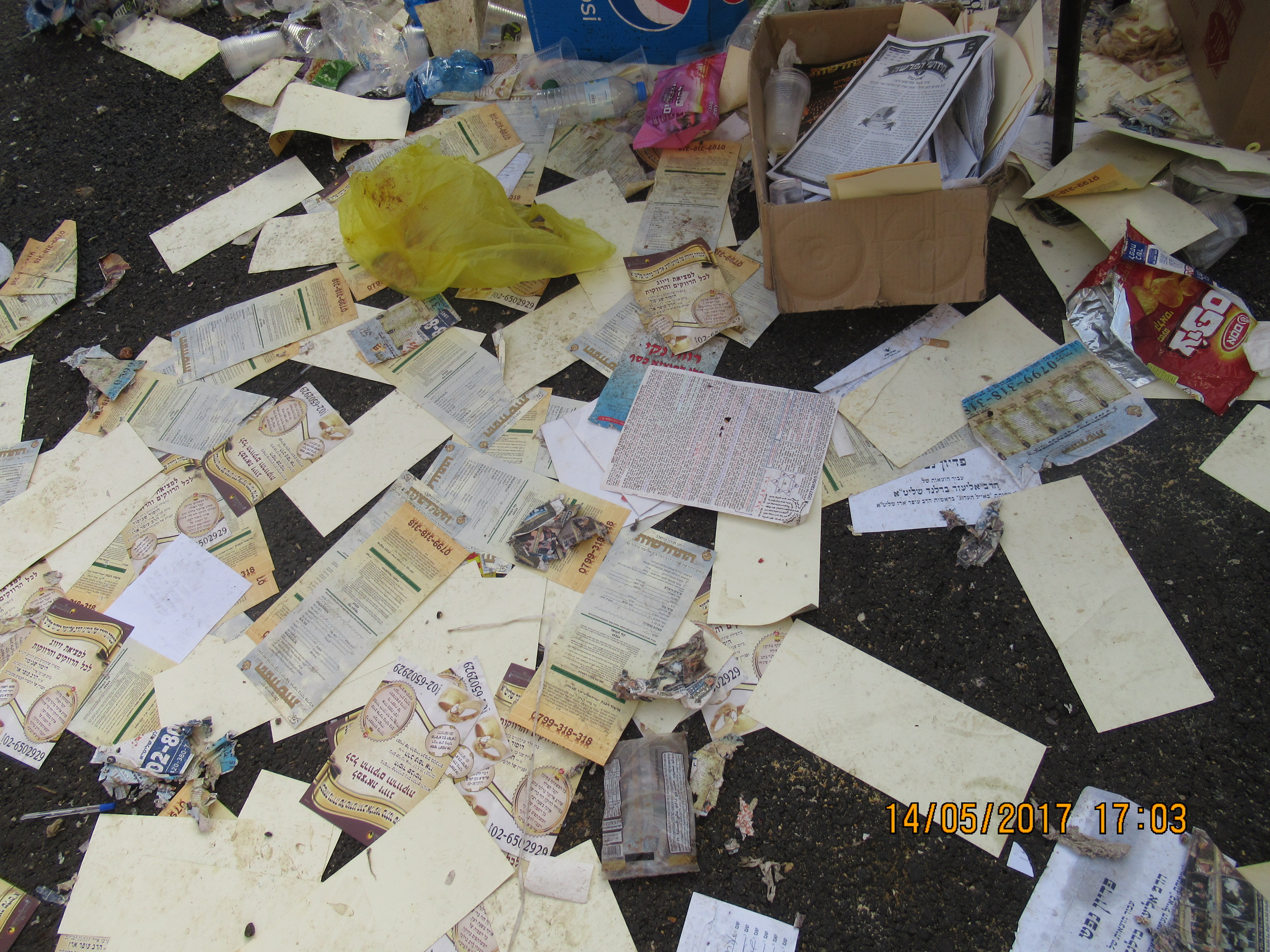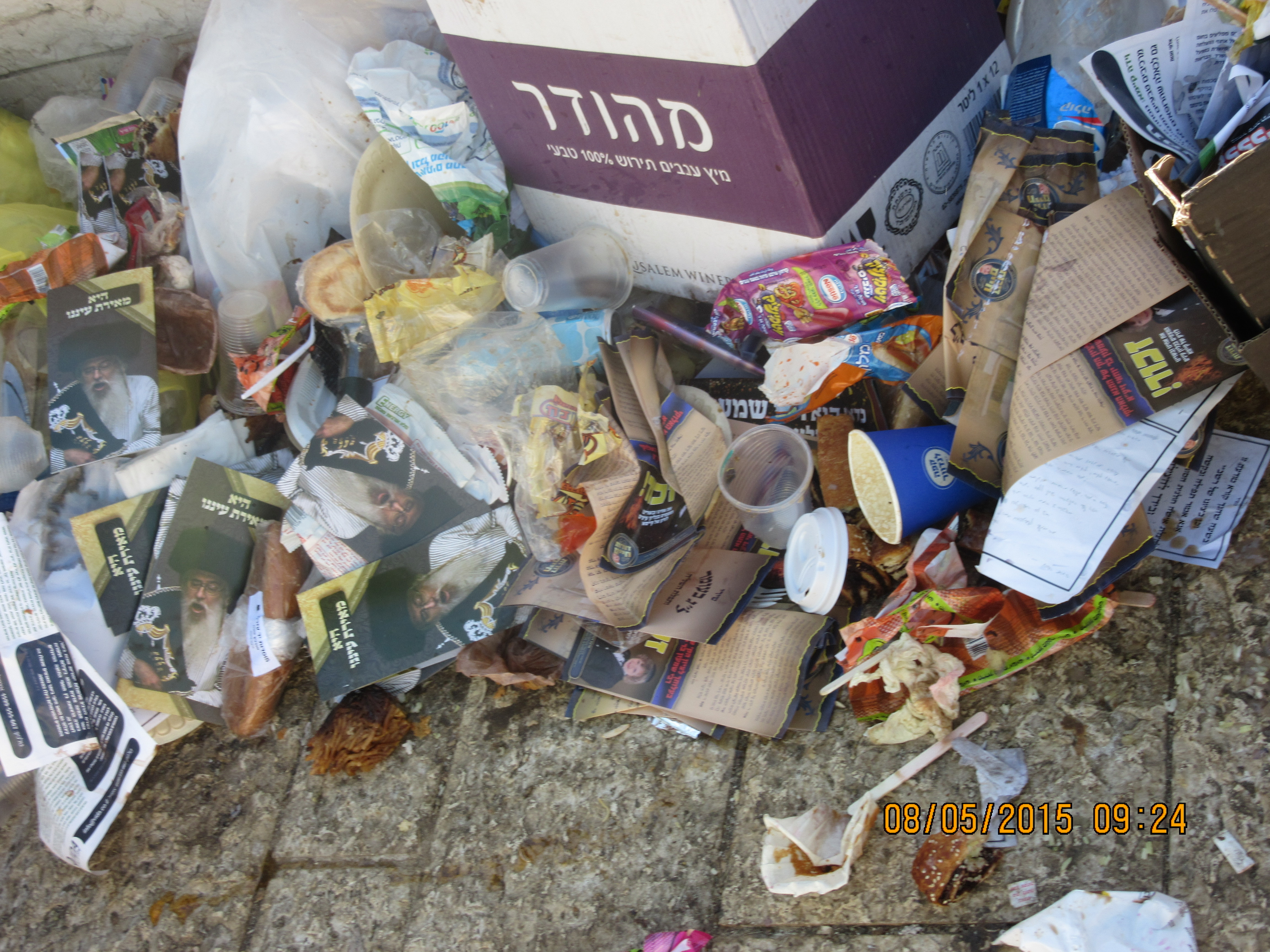Rabbi Kahanovitz: 'It's Shocking, Tons of Holy Writings in Meron Are Thrown in the Trash'
Ahead of Lag BaOmer, Rabbi Kahanovitz from the Committee on Halachic Genizah calls on visitors to Meron: 'Beware of promotional leaflets distributed with holy words. This is a mitzvah that comes with transgression.'

Lag BaOmer is just around the corner, and if you also plan to travel to Meron this year, you should carefully read the heartfelt words of Rabbi Avraham Kahanovitz, secretary of the Committee on Genizah Affairs.
"Every year, at the celebration in Meron, tens of thousands of leaflets, booklets, and promotional pages containing holy words are distributed," he notes. "Some are spread by various groups with the good intention of educating the masses through free distribution of prayers and Torah materials, while others are distributed by advertisers who have realized the enormous potential of gathering a large public in one place and distribute all kinds of advertisement pages. To give the ads a sense of sanctity, they include poems, prayers, and words of Torah. Some even go so far as to write the sacred names in full."
Rabbi Kahanovitz expresses his distress: "I am appalled every time to see after the celebration the immense quantities of sacred writings disgracefully scattered everywhere, along with tens of thousands of leaflets that were not fully distributed and are left abandoned without accountability. This is also true at bus parking lots, as every bus arriving to Meron is cleaned, and the cleaning workers sweep all the waste, which includes many holy writings distributed at departure stations for study and prayer along the way, directly into the trash."

Is there a way to write sacred words that wouldn't require genizah?
"Unfortunately not. Generally, what appears to be holy is indeed holy. Even if full verses are not written, the mere intention for the content to be sacred sanctifies the material. Mentioning the name of Hashem is a Torah prohibition, and other things are rabbinically prohibited, which is also serious. There is almost no way to organize the materials without requiring genizah."
Lag BaOmer is just around the corner, and if you also plan to travel to Meron this year, you should carefully read the heartfelt words of Rabbi Avraham Kahanovitz, secretary of the Committee on Genizah Affairs.
"Every year, at the celebration in Meron, tens of thousands of leaflets, booklets, and promotional pages containing holy words are distributed," he notes. "Some are spread by various groups with the good intention of educating the masses through free distribution of prayers and Torah materials, while others are distributed by advertisers who have realized the enormous potential of gathering a large public in one place and distribute all kinds of advertisement pages. To give the ads a sense of sanctity, they include poems, prayers, and words of Torah. Some even go so far as to write the sacred names in full."
Rabbi Kahanovitz expresses his distress: "I am appalled every time to see after the celebration the immense quantities of sacred writings disgracefully scattered everywhere, along with tens of thousands of leaflets that were not fully distributed and are left abandoned without accountability. This is also true at bus parking lots, as every bus arriving to Meron is cleaned, and the cleaning workers sweep all the waste, which includes many holy writings distributed at departure stations for study and prayer along the way, directly into the trash."
Is there a way to write sacred words that wouldn't require genizah?
"Unfortunately not. Generally, what appears to be holy is indeed holy. Even if full verses are not written, the mere intention for the content to be sacred sanctifies the material. Mentioning the name of Hashem is a Torah prohibition, and other things are rabbinically prohibited, which is also serious. There is almost no way to organize the materials without requiring genizah."
Tons of Genizah Thrown Away
Rabbi Kahanovitz explains that the Committee on Genizah Affairs has taken on the task for many years to remove this disgrace. "We have dedicated volunteers who literally selflessly collect what can be saved, under the scorching sun or at the expense of their night's sleep. They tread the bus parking lots, hospitality tents, roads leading to the shrine, and the shrine itself. They constantly race against time because the greatest pressure is that the cleaning workers will get there first and the genizah will be, God forbid, thrown away. The problem is that the cleaning workers are also diligently doing their job... In the end, we collect more than ten tons of genizah each year and transfer them for burial as required, but there are still enormous quantities that are thrown away. We have no way to prevent this disgrace.
"Most people accept the pages distributed," he adds, "but after reading, they don't take them home; they leave them in Meron. So, each year, we count millions upon millions of leaflets thrown away in a humiliating and very disrespectful manner."

Why don't you try to stop the advertisers from distributing these leaflets?
"We really try to explain these issues to them. Some advertisers are genuinely unaware of the problem, and after we explain it to them, they stop distributing holy words. But there are those who can't seem to resist the lure of massive advertising. There are groups we talk to who explain that they aim to benefit the masses. It's so absurd because, in the end, distributors and the public who take the material are involved in a mitzvah that comes with a transgression. It's a shame that such a monumental day, its beginning and end filled with prayers and spiritual elevation, is associated with such a grave sin of desecrating the holy names and holy words.
"We always try to offer alternative ways," adds Rabbi Kahanovitz. "Two years ago, someone distributed the daily study page, and later we contacted him and told him about the shocking places we found his distributed leaflets. He was very alarmed and last year told us that instead of leaflets, he set up a phone line for daily study during the celebration. This phone line received no less than 15,000 calls. It proves that, yes, there are alternative methods."
Last year, Rabbi Kahanovitz says significant progress was made on the issue. "The great rabbis of Israel publicly urged not taking materials distributed at departure stations and in Meron itself, and the painful scenes decreased considerably. But as I've mentioned, the problem still exists. Therefore, it's very clear to me that the solution is available and simple — if we reach a point where the public doesn't cooperate with the distributors, we will succeed in stopping this phenomenon without a doubt."


